高中英语常用句型归纳总结
- 格式:doc
- 大小:90.00 KB
- 文档页数:8
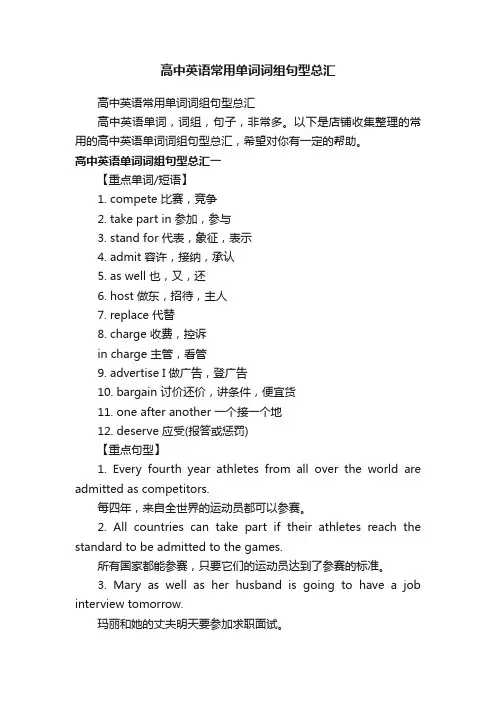
高中英语常用单词词组句型总汇高中英语常用单词词组句型总汇高中英语单词,词组,句子,非常多。
以下是店铺收集整理的常用的高中英语单词词组句型总汇,希望对你有一定的帮助。
高中英语单词词组句型总汇一【重点单词/短语】1. compete 比赛,竞争2. take part in 参加,参与3. stand for 代表,象征,表示4. admit 容许,接纳,承认5. as well 也,又,还6. host 做东,招待,主人7. replace 代替8. charge 收费,控诉in charge 主管,看管9. advertise I做广告,登广告10. bargain 讨价还价,讲条件,便宜货11. one after another 一个接一个地12. deserve 应受(报答或惩罚)【重点句型】1. Every fourth year athletes from all over the world are admitted as competitors.每四年,来自全世界的运动员都可以参赛。
2. All countries can take part if their athletes reach the standard to be admitted to the games.所有国家都能参赛,只要它们的运动员达到了参赛的标准。
3. Mary as well as her husband is going to have a job interview tomorrow.玛丽和她的丈夫明天要参加求职面试。
4. Tom, who married a pretty musician, has been married for ten years.汤姆和一个美丽的音乐家结婚已经十年了。
5. All the players compete for honour as well as gold medals.运动员们为金牌而战也为荣誉而战。

高中英语知识点归纳比较级和最高级的句型比较级和最高级的句型是英语中常用的一种语法结构,用来进行比较和描述物品或人的相对程度。
下面是有关比较级和最高级句型的归纳和总结。
1. 比较级的结构:a) 主语 + be (或其他系动词) + 形容词/副词 + 比较级 + than + 宾语例:Tom is taller than his brother.She runs faster than me.b) 主语 + 动词 + 形容词/副词 + 比较级 + than + 宾语例:My car runs faster than yours.They work harder than us.2. 最高级的结构:a) 主语 + be (或其他系动词) + the + 最高级 + of + 宾语 (当宾语是可数名词时)例:She is the smartest student in the class.He is the tallest boy in the group.b) 主语 + 动词 + the + 最高级 + of + 宾语 (当宾语是可数名词时)例:This book is the most interesting one of all.They are the best athletes in the team.3. 比较级和最高级的句型常用于以下情境:a) 比较两者之间的差异或相似程度- 比较级:A is + 形容词/副词 + than B例:This car is more expensive than that one.He works harder than his sister.- 最高级:A is the + 最高级 + of (all/in) B 例:This is the longest bridge in the country.She is the smartest student in the class.b) 描述一组三者或多者之间的差异或相似程度 - 比较级:A is + 形容词/副词 + than B and C 例:This car is faster than any other car in the race. He runs more quickly than his siblings.- 最高级:A is the + 最高级 + in/of (all) B and C 例:This is the biggest park in the city.She is the tallest among all her friends.4. 比较级和最高级的形容词和副词变化规则:a) 一般形容词/副词 + -er (比较级) + -est (最高级)例:fast - faster - fastesttall - taller - tallestb) 以-e结尾的形容词/副词 + -r (比较级) + -st (最高级)例:large - larger - largestnice - nicer - nicestc) 重读闭音节,末尾只有一个辅音字母的形容词/副词,需双写最后一个辅音字母 + -er (比较级) + -est (最高级)例:big - bigger - biggesthot - hotter - hottest总结:比较级和最高级的句型是一种用来进行比较和描述相对程度的常用语法结构。
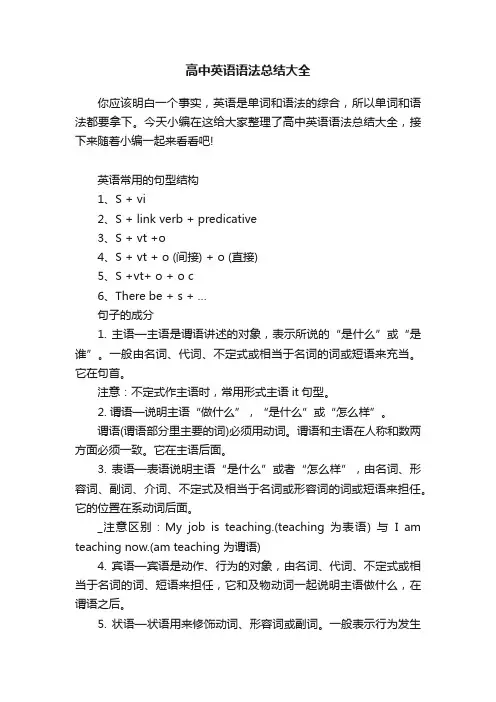
高中英语语法总结大全你应该明白一个事实,英语是单词和语法的综合,所以单词和语法都要拿下。
今天小编在这给大家整理了高中英语语法总结大全,接下来随着小编一起来看看吧!英语常用的句型结构1、S + vi2、S + link verb + predicative3、S + vt +o4、S + vt + o (间接) + o (直接)5、S +vt+ o + o c6、There be + s + …句子的成分1. 主语—主语是谓语讲述的对象,表示所说的“是什么”或“是谁”。
一般由名词、代词、不定式或相当于名词的词或短语来充当。
它在句首。
注意:不定式作主语时,常用形式主语it句型。
2. 谓语—说明主语“做什么”,“是什么”或“怎么样”。
谓语(谓语部分里主要的词)必须用动词。
谓语和主语在人称和数两方面必须一致。
它在主语后面。
3. 表语—表语说明主语“是什么”或者“怎么样”,由名词、形容词、副词、介词、不定式及相当于名词或形容词的词或短语来担任。
它的位置在系动词后面。
_注意区别:My job is teaching.(teaching 为表语) 与I am teaching now.(am teaching 为谓语)4. 宾语—宾语是动作、行为的对象,由名词、代词、不定式或相当于名词的词、短语来担任,它和及物动词一起说明主语做什么,在谓语之后。
5. 状语—状语用来修饰动词、形容词或副词。
一般表示行为发生的时间、地点、目的、方式、程度等意义,一般由副词、介词短语、不定式或相当于副词的词或短语来表示。
状语一般放在句末,但有的可以放在句首、句中。
6. 定语—定语是用来修饰名词或代词的。
形容词、代词、数词、名词、介词短语、不定式或相当于形容词的词或短语等都可以担任定语。
因为它是修饰名词或代词的,而名词和代词又可以作主语,还可以作表语和宾语,所以定语的位置很灵活,凡是有名词、代词的地方都可以有定语。
简单句、并列句、复合句句型:主语+谓语只包含一个主谓结构,而句子的各个结构都只由单词或短语表示。
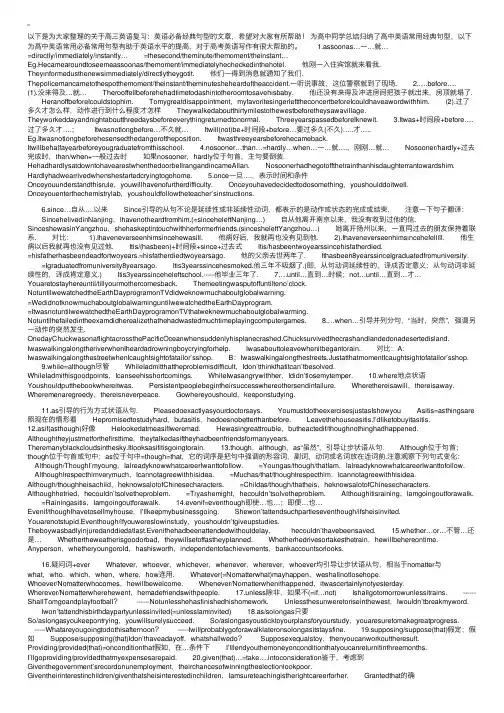
以下是为⼤家整理的关于⾼三英语复习:英语必备经典句型的⽂章,希望对⼤家有所帮助!为⾼中同学总结归纳了⾼中英语常⽤经典句型,以下为⾼中英语常⽤必备常⽤句型有助于英语⽔平的提⾼,对于⾼考英语写作有很⼤帮助的。
1.assoonas…⼀…就…=directly/immediately/instantly… =thesecond/theminute/themoment/theinstant… Eg.Hecamearoundtoseemeassoonas/themoment/immediatelyhecheckedinthehotel. 他刚⼀⼊住宾馆就来看我. Theyinformedusthenewsimmediately/directlytheygotit. 他们⼀得到消息就通知了我们. Thepolicemancametothespotthemoment/theinstant/theminutesheheardoftheaccident.⼀听说事故,这位警察就到了现场. 2.….before…. (1).没来得及…就… Therooffellbeforehehadtimetodashintotheroomtosavehisbaby. 他还没有来得及冲进房间把孩⼦就出来,房顶就塌了. HeranoffbeforeIcouldstophim. Tomygreatdisappointment,myfavoritesingerlefttheconcertbeforeIcouldhaveawordwithhim. (2).过了多久才怎么样,动作进⾏到什么程度才怎样 Theywalkedaboutthirtymilestothewestbeforetheysawavillage. Theyworkeddayandnightaboutthreedaysbeforeeverythingreturnedtonormal. ThreeyearspassedbeforeIknewit. 3.Itwas+时间段+before….过了多久才….; Itwasnotlongbefore…不久就… Itwill(not)be+时间段+before…要过多久(不久)…..才….. Eg.Itwasnotlongbeforehesensedthedangeroftheposition. Itwasthreeyearsbeforehecameback. Itwillbehalfayearbeforeyougraduatefromthisschool. 4.nosooner…than…=hardly…when…⼀…就….,刚刚…就… Nosooner/hardly+过去完成时,than/when+⼀般过去时 如果nosooner,hardly位于句⾸,主句要倒装. HehadhardlysatdowntohavearestwhenthedoorbellrangandincameAllan. Nosoonerhadhegotoffthetrainthanhisdaughterrantowardshim. Hardlyhadwearrivedwhenshestartedcryingtogohome. 5.once⼀旦….,表⽰时间和条件 Onceyouunderstandthisrule,youwillhavenofurtherdifficulty. Onceyouhavedecidedtodosomething,youshoulddoitwell. Onceyouenterthechemistrylab,youshouldfollowtheteacher’sinstructions. 6.since…⾃从….以来 Since引导的从句不论是延续性或⾮延续性动词,都表⽰的是动作或状态的完成或结束. 注意⼀下句⼦翻译: SincehelivedinNanjing,Ihavenotheardfromhim.(=sinceheleftNanjing…) ⾃从他离开南京以来,我没有收到过他的信. SinceshewasinYangzhou,shehaskeptintouchwithherformerfriends.(sincesheleftYangzhou…) 她离开扬州以来,⼀直同过去的朋友保持着联系. 对⽐: 1).Ihaveneverseenhimsincehewasill. 他病好后,我就再也没有见到他. 2).Ihaveneverseenhimsincehefellill. 他⽣病以后我就再也没有见过他. Itis/(hasbeen)+时间段+since+过去式 Itis/hasbeentwoyearssincehisfatherdied. =hisfatherhasbeendeadfortwoyears.=hisfatherdiedtwoyearsago. 他的⽗亲去世两年了. Ithasbeen8yearssinceIgraduatedfromuniversity. =Igraduatedfromuniversity8yearsago. Itis3yearssincehesmoked.他三年不吸烟了.(即,从句动词延续性的,译成否定意义;从句动词⾮延续性的,译成肯定意义.) Itis3yearssinceheleftschool.-----他毕业三年了. 7….until…直到…时候;not…until…直到…才… Youaretostayhereuntil/tillyourmothercomesback. Themeetingwasputoffuntilteno’clock. NotuntilwewatchedtheEarthDayprogramonTVdidweknowmuchaboutglobalwarning. =WedidnotknowmuchaboutglobalwarninguntilwewatchedtheEarthDayprogram. =ItwasnotuntilwewatchedtheEarthDayprogramonTVthatweknewmuchaboutglobalwarming. Notuntilhefailedintheexamdidherealizethathehadwastedmuchtimeplayingcomputergames. 8.…when…引导并列分句,“当时,突然”,强调另⼀动作的突然发⽣. OnedayChuckwasonaflightacrossthePacificOceanwhensuddenlyhisplanecrashed.Chucksurvivedthecrashandlandedonadesertedisland. IwaswalkingalongtheriverwhenIheardadrowningboycryingforhelp. Iwasabouttoleavewhenitbegantorain. 对⽐:A:IwaswalkingalongthestreetwhenIcaughtsightofatailor’sshop. B:Iwaswalkingalongthestreets.JustatthatmomentIcaughtsightofatailor’sshop. 9.while=although尽管 WhileIadmitthattheproblemisdifficult,Idon’tthinkthatitcan’tbesolved. WhileIadmithisgoodpoints,Icanseehisshortcomings. WhileIwasangrywithher,Ididn’tlosemytemper. 10.where地点状语 Youshouldputthebookwhereitwas. Persistentpeoplebegintheirsuccesswhereothersendinfailure. Wherethereisawill,thereisaway. Wheremenaregreedy,thereisneverpeace. Gowhereyoushould,keeponstudying. 11.as引导的⾏为⽅式状语从句. Pleasedoexactlyasyourdoctorsays. YoumustdotheexercisesjustasIshowyou Asitis=asthingsare 照现在的情形看 Hepromisedtostudyhard,butasitis,hedoesnobetterthanbefore. Leavethehouseasitis.I’dliketobuyitasitis. 12.asif(asthough)好像 HelookedatmeasifIweremad. Hewasingreattrouble,butheactedif/thoughnothinghadhappened. Althoughtheyjustmetforthefirsttime,theytalkedasiftheyhadbeenfriendsformanyyears. Theremanyblackcloudsinthesky.Itlooksasifitisgoingtorain. 13.though,although,as“虽然”,引导让步状语从句. Although位于句⾸;though位于句⾸或句中;as位于句中=though=that,它的词序是把句中强调的形容词,副词,动词或名词放在连词前.注意观察下列句式变化: Although/ThoughI’myoung,IalreadyknowwhatcareerIwanttofollow. =Youngas/though/thatIam,IalreadyknowwhatcareerIwanttofollow. AlthoughIrespecthimverymuch,Icannotagreewithhisidea. =Muchas/that/thoughIrespecthim,Icannotagreewithhisidea. Although/thoughheisachild,heknowsalotofChinesecharacters. =Childas/though/thatheis,heknowsalotofChinesecharacters. Althoughhetried,hecouldn’tsolvetheproblem. =Tryashemight,hecouldn’tsolvetheproblem. Althoughitisraining,Iamgoingoutforawalk. =Rainingasitis,Iamgoingoutforawalk. 14.evenif=eventhough即使…也…;即便…也… Evenif/thoughIhavetosellmyhouse,I’llkeepmybusinessgoing. Shewon’tattendsuchpartieseventhough/ifsheisinvited. Youarenotstupid.Eventhough/ifyouwereslowinstudy,youshouldn’tgiveupstudies. Theboywasbadlyinjuredanddiedatlast.Evenifhehadbeenattendedwithoutdelay, hecouldn’thavebeensaved. 15.whether…or…不管…还是… Whethertheweatherisgoodorbad,theywillsetoffastheyplanned. Whetherhedrivesortakesthetrain,hewillbehereontime. Anyperson,whetheryoungorold,hashisworth,independentofachievements,bankaccountsorlooks. 16.疑问词+ever Whatever,whoever,whichever,whenever,wherever,whoever均引导让步状语从句,相当于nomatter与what,who,which,when,where,how连⽤. Whatever(=Nomatterwhat)mayhappen,weshallnotlosehope. Whoever/Nomatterwhocomes,hewillbewelcome. Whenever/Nomatterwhenithappened,itwascertainlynotyesterday. Wherever/Nomatterwherehewent,hemadefriendswithpeople. 17.unless除⾮,如果不(=if…not) Ishallgotomorrowunlessitrains. ------ShallTomgoandplayfootball? ------Notunlesshehasfinishedhishomework. Unlessthesunweretoriseinthewest,Iwouldn’tbreakmyword. Iwon’tattendhisbirthdaypartyunlessinvited(=unlessIaminvited) 18.as/solongas只要 So/aslongasyoukeepontrying,youwillsurelysucceed. So/aslongasyousticktoyourplansforyourstudy,youaresuretomakegreatprogress. -----Whatareyougoingtodothisafternoon? -----Iwillprobablygoforawalklateronsolongasitstaysfine. 19.supposing/suppose(that)假定;假如 Suppose/supposing(that)Idon’thaveadayoff,whatshallwedo? Supposexequalstoy,thenyoucanworkouttheresult. Providing/provided(that)=onconditionthat假如,在…条件下 I’lllendyouthemoneyonconditionthatyoucanreturnitinthreemonths. I’llgoproviding/providedthatmyexpensesarepaid. 20.given(that)…=take….intoconsideration鉴于,考虑到 Giventhegovernment’srecordonunemployment,theirchancesofwinningtheelectionlookpoor. Giventheirinterestinchildren/giventhatsheisinterestedinchildren,Iamsureteachingistherightcareerforher. Grantedthat的确 Grantedthatit’sasplendidcar,buthaveyouseenwhatitcosts? 21.incasethat…万⼀;以防;incaseof+n万⼀ Incase(that)Johncomes/shouldcome,pleasetellhimtowait. (incasethat后谓语⽤⼀般现在时或should+动词原型) PleaseremindmeaboutitincaseIforget/shouldforget. Pleasetakemyumbrellaincase(that)itrains/shouldrain. Incaseoffire,whatshouldwedo? 22.祈使句(表条件)+orelse/or/otherwise+主句(表结果)….否则…,要不然…. Pleasecallmeupbeforeyoucome,otherwise/orelse/orwemightbeout. Hurryup,oryouwillbelate. 祈使句(表条件)+and+主句(表结果) Givehimaninchandhewilltakeamile. Beunitedandcooperatewitheachotherandonlyinthiswaycanwesaveourearth. 23.as(so)…as…和…⼀样 HenryisasgoodaplayerasPeter(is). Heworkedasfastasaskilledworker(did). Wewillgiveyouasmuchhelpaswecan. 24.形容词/副词⽐较级+than 注意:形容词和副词的⽐较级前还可以加⼀个表⽰程度的修饰语,常⽤的修饰语是: (1).alittle,abit,slightly稍微;⼀些 (2).Much,alot,greatly,agreatdeal,far,byfar….得多 (3).Still,even,rather更 (4).Any⼀般⽤于疑问句,表⽰‘⼀些”;“稍微” (5).倍数或数量词. Thistextisalittle(abit)moredifficultthantheother. Hehasmadefargreaterprogressthistermthanhedidlastterm. Withthedevelopmentofsociety,peopleinChinaareagooddealricherthanbefore. Heistwoyearsolderthan=heisolderthanIbytwoyears. AsiaisthreetimeslargerthanEurope. =AsiaisthreetimesaslargeasEurope. =AsiaisthreetimesthesizeofEurope. 还应注意,当more作为many,much的⽐较级时,其修饰语分别是 (1).many,afew,+more+可数名词复数 (2)much,alittle,abit,agreatdeal+more+不可数名词 (3).alot,some,far,any+more+可数或不可数均可,more译作“另外” I’vemadealot(many)moremistakesthanyou’ve Hehasbuiltupalargebusinessandearnedmuchmoremoneythanbefore. 25.byfar最….;⽐….得多 注意:byfar既可修饰⽐较级⼜可修饰级,注意byfar在句中的位置. Heworkedharderbyfarthanhiselderbrother. Heisbyfarthetallerofthetwobasketballplayers. Heisbyfarthetallestofalltheplayersontheteam. Hisexplanationisbyfarclearerthantheoldone. 26.the+⽐较级….,the+⽐较级……越…,越….. Themoreyouneed,thebetteryouunderstand. Thehigherupyougo,thecolderitbecomes. Abodyweighslessthefurtheritgetsfromthesurfaceoftheearth. =Thefurtheritgetsfromthesurfaceoftheearth,thelessthebodyweights. Thesooner,thebetter. 27.no+⽐较级+than表⽰“A和B都不……” Not+⽐较级+than表⽰“A不如B……” Thisbookisnomoreinterestingthanthatone. HeworksnoharderthanI.他和我都不⽤功. Hedoesn’tworkharderthanI.他不如我⽤功 Morethan不仅仅nomorethan只不过,仅仅notmorethan=atmost不多于 Therearenomorethantenstudentsintheclassroom. Therearenotmorethantenstudentsintheclassroom. Heisnomorethanachild,soIdon’ttakehimtooseriously. Inourstudents’eyes,heismorethanateacher,heismorelikeourfriend. More+adj/n+than+adj/n与其说……倒不如说…… Heismoreofastudentthanofateacher.与其说他是个⽼师,倒不如说他是个学⽣. Heismorediligentthanclever.与其说他聪明,倒不如说他勤奋. 28.superior较⾼的,上好的,出众的,⾼傲的 Senior年长的,资格较⽼的,地位较⾼的,⾼级的 Junior年少的,下级的,和to搭配 Thiswesternrestaurantissuperiortotheonewewenttolastweek. Heisthreeyearsjuniortome=Heisjuniortomethreeyears. Sheisseniortoeveryoneelseinthecompany. 29.so+adj/adv+that;such(a/an)+adj+that“如此…..以⾄于…..”引导结果状语从句. HisEnglishwassolimitedthathecouldn’tunderstandwhatthenativespeakerssaid. Hewassodevotedtohisstudentsthatheoftenfellillfromoverworking. Itwassuchwarmweatherthatwewentswimming. Tabletennisissuchapopulargamethatpeopleallovertheworldplayit. 还应注意: (1)当名词前有many/much/few/little修饰时, ⽤so+n=that结构.即somany/much/few/little+n+that… Thereweresomanypeopleinthestreetwatchingthefirethatfirefighterscouldn’tgetclosetothebuilding. TheWesternerseatsomuchfatandsugarthattheyputonweighteasily. Thecountryhassolittlecoalthatithastoimportlargequantitiesofcoal. Therearesofewfishinthepoolthatwecan’tfishthemeasily. (2)such+a/an+adj.+n+that=so+adj.+a/an+n+that Heissuchanhonestpersonthatyoucandependonhimwhenyou’reintrouble. Heissohonestapersonthatyoucandependonhimwhenyou’reintrouble. (3)由so…that和such…that引导的结果状语从句的倒装结构.当so和其后的形容词或副词;such连词后的名词放在句⾸时,主句使⽤倒装结构 Suchgreatprogresshashemadeinhisstudiesthatwealladmirehim. (4)such…that句型的特殊性:such后可以不出现adj和n,也可以倒装. Hisbehaviorwassuchthatallhisfriendsdesertedhim. =Suchwashisbehaviorthatallhisfriendsdesertedhim. Theforceoftheexplosionwassuchthatallthewindowswerebroken. =Suchwastheforceoftheexplosionthatallthewindowswerebroken. 30.inorderthat;sothat(为了….)引导⽬的状语从句 Hegotupearlyinorderthat/sothathecouldcatchthefirstbus. Heclosedallthewindowswhiledrivingsothatheshouldn’tcatchcold. (sothat否定句要⽤shouldn’t) Sothat引导结果状语从句 对⽐:(1).hesetoffearly,sothathecaughtthefirstbus. (2).hesetoffearlysothathecouldcatchthefirstbus. 31.soasto/inorderto/to为了.作⽬的状语 Hewenthometoseehismother. Heshoutedandwavedsoastobenoticed. Johnhurriedsoasnottobelatefortheparty. Modernequipmentisfittedinourclassroomforallthestudentstostudywell. Theletterwasreadoutforallinthecourttohear. 注意:todo/inordertodo可放在句⾸,soasto不可 (1)._____lateinthemorning,Bobturnedoffthealarm. A.HavingsleptB.TosleepC.SleepingD.Sleep (2).-------Dad,Whydoyoubuysomanytapesformetolistento? -----______yourlistening. A.ImproveB.ImprovingC.HavingimprovedD.Toimprove (3).Dowhateveryoucould_____him. A.helpB.tohelpC.helpingD.helping 注意:只有不定式todo/inordertodo/soastodo可以作⽬的状语 Onlytodo表⽰未曾料到的愉快或不愉快的结果: Shewokeearlyonlytofinditwasraining. Hegothomeonlytolearnthathisfatherwasill. Hegottothestationonlytofindthetrainhadgone. “Liftingarockonlytodropitonone’sfeet”isaChinesefolksaying. ShehurriedbackonlytofindheroldfriendGeorgewaitingforhim. 对⽐: 现在分词表⽰主句动作所造成的结果: Hewascaughtintherain,thuscatchingcold. Theircarwascaughtinthetrafficjam,thuscausingthedelay. Todo作结果状语:(表⽰不愉快或意外结果) Hemustbedeafnottohearthat.他聋得听不见. Shewentabroadnevertoreturn.她出国了,结果再也没回来. 32.so+adj/adv+asto如此…以⾄于…作结果状语: Wouldyoubesokindastolendmeyourbicycle? Hewassofoolishastobelievesuchaman. Such…..asto如此…以⾄于…作结果状语: Don’tbesoupset,myillnessisnotsuchastocauseanxiety. Heissuchafoolastothinkthatheissomebodyandinfluenceothers. 他愚蠢地认为他是个了不起的⼤⼈物,可以影响其他⼈. 33.….enoughto….作结果状语,“⾜够…可以…” Heisoldenoughtogotoschool. Toourgreatsurprise,childasheis,heisboldenoughtorobpassers-by. Weareoldenoughtomakeagreatdifferencetotheworld. Thechampionranwellenoughtosetupanotherworldrecordindeedifshehadtriedharder. 她的确跑得相当快,不过要是她再努⼒⼀些,作为冠军就会再次创造⼀个世界记录. 34.too…to作结果状语,“太….⽽不能” Inmyopinion,theproblemwithmoststudentsliesinthefactthattheyaretooshytospeakEnglishinpublic. Wearenevertoooldtolearn. Heistooclevernottoreadourtricks.他⾮常聪明完全可以识破我们的诡计. 35.can’t/cannever和too,toomuch,enough,over搭配表⽰“⽆论怎样……都不过分” Whileyouaredoingyourhomework,youcan’tbecarefulenough. Heissuchagreatmanthatwecan’tpraisehimtoomuch. ThedevelopmentofsocietyhasmadeitnecessaryforustohaveagoodknowledgeofEnglish,sowecan’toveremphasizetheimportanceoflearningEnglish. Sinceit’sagoodthing,wecan’tdoittoosoon.。
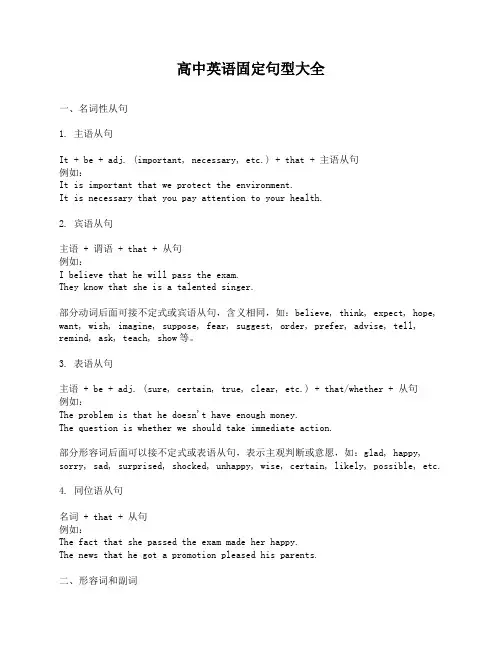
高中英语固定句型大全一、名词性从句1. 主语从句It + be + adj. (important, necessary, etc.) + that + 主语从句例如:It is important that we protect the environment.It is necessary that you pay attention to your health.2. 宾语从句主语 + 谓语 + that + 从句例如:I believe that he will pass the exam.They know that she is a talented singer.部分动词后面可接不定式或宾语从句,含义相同,如:believe, think, expect, hope, want, wish, imagine, suppose, fear, suggest, order, prefer, advise, tell, remind, ask, teach, show等。
3. 表语从句主语 + be + adj. (sure, certain, true, clear, etc.) + that/whether + 从句例如:The problem is that he doesn't have enough money.The question is whether we should take immediate action.部分形容词后面可以接不定式或表语从句,表示主观判断或意愿,如:glad, happy, sorry, sad, surprised, shocked, unhappy, wise, certain, likely, possible, etc.4. 同位语从句名词 + that + 从句例如:The fact that she passed the exam made her happy.The news that he got a promotion pleased his parents.二、形容词和副词1. 形容词的比较级和最高级比较级:主语 + be (am, is, are) + 形容词比较级 + than + 被比较的对象例如:She is taller than her sister.This book is more interesting than that one.最高级:主语 + be (am, is, are) + the + 形容词最高级 + 名词例如:He is the tallest boy in his class.This is the most beautiful painting I have ever seen.2. 常用的形容词和副词beautiful, handsome, pretty, ugly, lovely, attractive, stunning, gorgeous, charming, cute, elegant, fashionable, stylish, glamorous, delightful, etc.good, great, excellent, wonderful, fantastic, fabulous, amazing, awesome, splendid, terrific, marvelous, etc.bad, terrible, awful, horrible, unpleasant, etc.expensive, cheap, reasonable, affordable, etc.fast, slow, quick, rapid, swift, etc.loud, quiet, noisy, etc.hard, easy, difficult, challenging, simple, complicated, complex, etc.high, low, tall, short, long, big, small, huge, tiny, etc.young, old, new, ancient, modern, etc.3. 形容词和副词的用法形容词可修饰名词,也可作表语副词一般修饰动词、形容词或其他副词三、倒装句1. 完全倒装句在以下情况下要使用完全倒装句:a) 句首为表示地点、方式等的介词短语时例如:Under the tree were two cats.In this way, we can solve the problem.b) 句首为表示方位的副词或介词短语时例如:Here comes the bus.Out rushed the students.c) 句首为表示否定、副词only、hardly, seldom, never等时例如:Never have I seen such a beautiful sunset.Not only does he play the piano well, but he also sings well.d) 句首为so, neither, nor时例如:So busy was he that he forgot to eat lunch.Neither do I like English, nor do I like math.2. 部分倒装句在以下情况下要使用部分倒装句:a) 句首为表示条件的介词短语时例如:Should you need any help, please let me know.Had I known your address, I would have sent you a postcard.b) 句首为表示时间的介词短语或副词短语时例如:At no time should you give up your dream.On no account can he stay out late.四、虚拟语气1. 条件句中的虚拟语气a) “与事实相反的条件句”:如果对过去的情况进行虚拟,主句要用“动词的过去完成时”,从句用“动词的过去完成时”或“would/could/might + have + 过去分词”的形式。
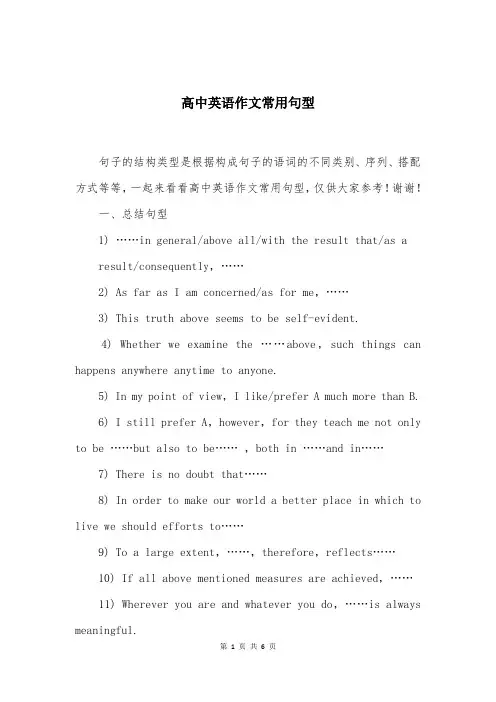
高中英语作文常用句型句子的结构类型是根据构成句子的语词的不同类别、序列、搭配方式等等,一起来看看高中英语作文常用句型,仅供大家参考!谢谢!一、总结句型1) ……in general/above all/with the result that/as aresult/consequently,……2) As far as I am concerned/as for me,……3) This truth above seems to be self-evident.4) Whether we examine the ……above,such things can happens anywhere anytime to anyone.5) In my point of view,I like/prefer A much more than B.6) I still prefer A,however,for they teach me not only to be ……but also to be……,both in ……and in……7) There is no doubt that……8) In order to make our world a better place in which to live we should efforts to……9) To a large extent,……,therefore,reflects……10) If all above mentioned measures are achieved,……11) Wherever you are and whatever you do,……is always meaningful.12) So clear/evident/obvious it is that there are quite different opinions on it.13) Now,which one do you prefer——the one……or the one……? Were it left to me to select,I should not hesitateda moment to choose the former/latter.二、开首句型1) Have you ever gone……? Have you ever been to……? If you have no experience like these,your life is an inadequate one.2) Are you……? Are you……? We are,usually.3) In large part as a consequence of……,somebody have focused a great deal of attention in recent years on something.4) We expect the day will come when A with its characteristic of……5) Being adj.is one of the virtues that people must possess (not only in……but also in……/during……/when……)6) What A to B,that C to D7) Currently,there is a widespread/serious concern over that……8) The reasons for the……are manifold,for instance,……9) Several factors contribute to this……,such as……,as for as I’m concerned,however,……is the most significantingredient/element.10) ……is more violent than what we thought it should be before.11) There are intimate relations between the two.三、并列句型1) Some people like A due to…… However,there are many young people,including me,especially like B.2) There might be two reasons,I think……,for the change.3) A and B are both important,they are attribute which are equally necessary for a person to achieve success in his life.4) Different people have different attitudes towards……,some believe that……others,however,argue that……still others maintain that……5) First……besides,in addition……what’s more……6) For one thing……nevertheless,for another……四、转折句型1)……Such defects as mentioned above can be prevented by the other way of ……2) Except for ……’s sake only.3) Perhaps A is the wrong word,however,B might be better.4) First……last but not least……5) Shall we do this? Not necessary the case.6) ……,and vice versa indeed .7) On the contrary,in spite of these increase……8) Compared with A,B has many advantages such as……9) Not so much…… as he had talked about.10) ……,the truth of the matter,however,is that……11) For some,the way maybe right,nevertheless,for many others……12) As everything going to the extreme has its negative aspects,so has……13) It is fairly well know that……however,it is less know that……14) ……,but this was not always the case.15) At first,……different in their opinions,on second thoughts,however,all of them agree to……16) None the less(尽管如此)……17) When people succeed,it is because of hard work,however,luck has a lot to do with it too.18) ……,sometimes it isn’t totally the case,however.19) Do some A else but B.五、名理句型1) It is usually the case that ……2) It is plain common sense——the more/less……themore/less……3) The serious reality had taught us a lesson: not being environment friendly will be avenged mercilessly.4) As a proverb says/as is known to all/as a popular saying goes,……5) I can think of no better illustration than an English poem/adage which goes like this:……6) The old story of……can serve as a good illustration that……六、强调句型1) With/due to/spurred by……we can certainly cope with any task we are faced with,that is,……2) The reason why……is no other than……as I know.3) The same thing is true with……4) What I want to point out is that,for a person who wants to be successful in life and to be useful in society,he will have to learn to be both A and B.5) What a wonderful picture? Especially for we students always swimming in the sea of books!6) It’s high time that immediate measures were taken to better the strength and face the challenges.7) Before everything else,……is the secret of success.七、图表句型1) From the figures/statistics given in the table it can be seen/noticed that……2) From the graph/table/diagram/chart above,we can see that……obviously.3) As show in the chart/by the graph……4) Have you ever anticipated the prospects of……in the coming decades? Let us just take a look at the figures of……as shown in the graph above.5) The gap between……and……will be further widened.6) In face of increasingly serious shortage of energy,we should take effective measures/which of the measures we should take?7) It is clear that the increase of percentage gets greater and greater.8) By……,the number of……had less/more than doubled/tripled compared with that of……9) 短语:made up about……/the figure amounted to/will rise to/will reach/will double that/will tripled that【高中英语作文常用句型大全】终于写完毕了,希望能够帮助到大家,谢谢!。
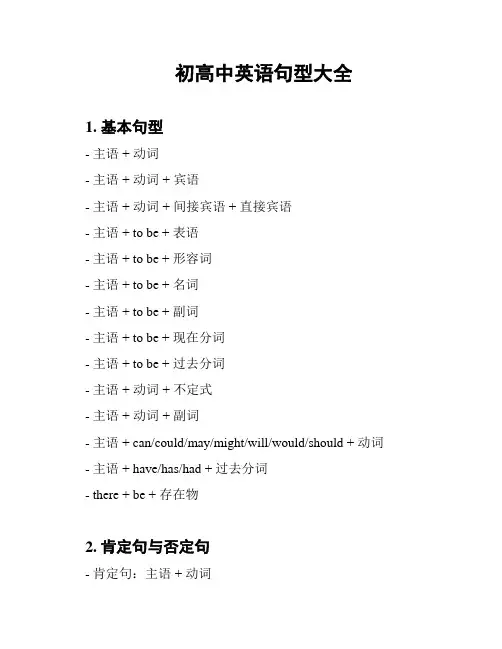
初高中英语句型大全1. 基本句型- 主语 + 动词- 主语 + 动词 + 宾语- 主语 + 动词 + 间接宾语 + 直接宾语- 主语 + to be + 表语- 主语 + to be + 形容词- 主语 + to be + 名词- 主语 + to be + 副词- 主语 + to be + 现在分词- 主语 + to be + 过去分词- 主语 + 动词 + 不定式- 主语 + 动词 + 副词- 主语 + can/could/may/might/will/would/should + 动词- 主语 + have/has/had + 过去分词- there + be + 存在物2. 肯定句与否定句- 肯定句:主语 + 动词- 否定句:主语 + do/does/did not + 动词- 否定句(be动词):主语 + am/is/are/not + 表语/形容词/名词/副词/现在分词/过去分词3. 一般疑问句- 一般疑问句:助动词/Be动词 + 主语 + 动词- 特殊疑问句:特殊疑问词 + 一般疑问句- 特殊疑问词:what/when/where/who/why/how4. 祈使句- 祈使句:动词 + 宾语5. 陈述句与疑问句转换- 陈述句变疑问句:陈述句 + 吗?- 特殊疑问句变陈述句:特殊疑问词 + 陈述句6. 感叹句- 感叹句:How + 形容词/副词 + 主语 + 动词!7. 虚拟语气- If从句 + 主语 + 动词(过去式),主句 + would/could/might + 动词(原形)以上是初高中英语常用的句型大全,希望对你有所帮助!。
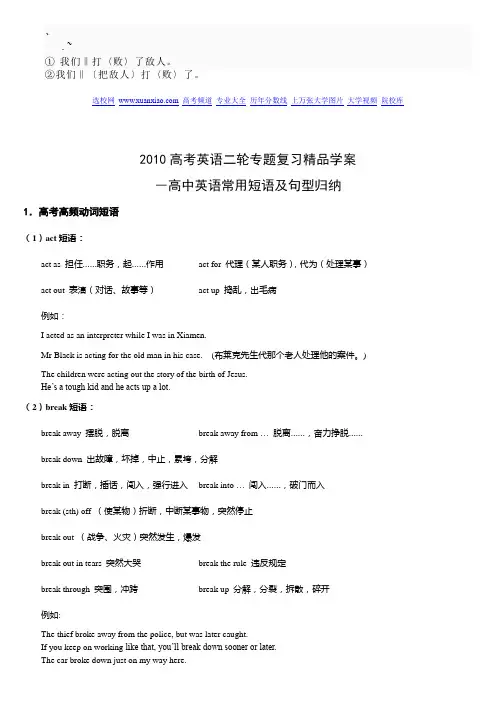
、.~①我们‖打〈败〉了敌人。
②我们‖〔把敌人〕打〈败〉了。
选校网高考频道专业大全历年分数线上万张大学图片大学视频院校库2010高考英语二轮专题复习精品学案―高中英语常用短语及句型归纳1.高考高频动词短语(1)act短语:act as 担任……职务,起……作用act for 代理(某人职务),代为(处理某事)act out 表演(对话、故事等)act up 捣乱,出毛病例如:I acted as an interpreter while I was in Xiamen.Mr Black is acting for the old man in his case. (布莱克先生代那个老人处理他的案件。
)The children were acting out the story of the birth of Jesus.He’s a tough kid and he acts up a lot.(2)break短语:break away 摆脱,脱离break away from …脱离……,奋力挣脱……break down 出故障,坏掉,中止,累垮,分解break in 打断,插话,闯入,强行进入break into …闯入……,破门而入break (sth) off (使某物)折断,中断某事物,突然停止break out (战争、火灾)突然发生,爆发break out in tears 突然大哭break the rule 违反规定break through 突围,冲跨break up 分解,分裂,拆散,碎开例如:The thief broke away from the police, but was later caught.If you keep on working like that, you’ll break down sooner or later.The car broke down just on my way here.If anyone tries to break in, the alarm will go off.If anyone tries to break into the building, the alarm will go off.She broke off a bit of bread and dipped it in the soup.I broke off the conversation and answered the phone.Does everyone know what to do if a fire breaks out?It may take a long time to break through the problem.In spring the icebergs begin to break up.(3)bring短语:bring about 引起,导致,使发生bring along 把……带来,领来bring back 拿回来,使恢复bring sb back 送回某人bring sth / sb back to life 使……生动/活泼,使……苏醒(比较:sth / sb come back to life 复苏,苏醒)bring down 使……降低,减少,使……倒下,使……落下bring down / up (the price) 降价/提价[比较:(the price ) go down / up 价格下降/上涨]bring in 引进(技术),赚钱,带来(收入),吸收bring on 发展,引起,导致,使前进bring out 拿出,出版,生产,揭露,阐明,使表现出bring to 使苏醒bring … to use = put …to use 对……加以利用bring / carry sth to / into effect 实施……(比较:sth come / go into effect 开始实施)bring up 抚养,培养,哺育例如:A huge amount of environmental damage has been brought about by the destruction of the rainforests.You’re welcome to bring along a friend.The government hopes these measures will help to bring down inflation (通货膨胀).American country music brings in more than $10 billion each year.This new kind of technology was brought in in the early 1980s.Stress can bring on (=lead to / result in) headaches and other illnesses.Jenny opened the cupboard and brought out a couple of bottles.He was brought up by his grandparents.(4)call短语:call at (sp) 访问(某地),拜访(某地)[比较:call on (sb) 拜访(某人),访问(某人)] call back 回电话call for 提倡,号召,要求,需要,去接某人,接走某人call / shout for help 呼救call in 请来,召集,来访,打电话call off 取消call on / upon 号召call out 大声呼喊,叫喊call sb…for short简称某人……call sb names 谩骂某人call up 给……打电话,使人想起,号召例如:We called at Mike’s house yesterday.All ships sailing on the oceans call for help by radio in English.I’ll call for my uncle at Beijing Railway Station.Let’s call in a doctor for the little girl.Many of these songs called on / upon the workers to take up the struggle.I shall call on him tomorrow.I heard somebody calling out to me from downstairs.Call me up tomorrow; my number is 536291.Your letter calls up the days when we worked together fifteen years ago.Due to the bad weather, the sports meeting has been called off.(5)come短语:come about 发生,产生come across 偶然相遇come along 来,随同,进展,加油come at …向……袭击come back 回来,想起来,复活come down 下来,下落,传下come down to…到达,从一处来到另一处come for…来拿,来取come from…来自,出生于come in 进来,进入come into being 形成,产生come into use 使用起来come off 脱落,从……离开come on 过来,跟我来,加油,来吧,赶快come on / upon sb / sth 偶然遇见,偶然碰上,偶然发现come out 露出,出来,出现,出版,发(芽),(花)开come over to…过来,顺便来访,从一个地方来到另一个地方come round / around (非正式)来访,串门come to …来到,出现,提及,达到,共计,结果是,苏醒come to an end 结束,终止come to know 逐渐地知道come to life (变得)活泼,苏醒过来come to light 显露,为人所知come to oneself 苏醒过来,恢复知觉come to / into power 当权,上台come / go to ruin = fall into ruin 变成废墟come to terms with…甘心忍受come true 变为现实,成为事实come up 被提出,上来,走来,上升,抬头,长出来come up to sb 朝某人走来come up with …提出,想出(主意),找出(答案),赶上例如:A number of educational reforms have come about as a result of the report.I came across an old friend of mine in the street the other day.Your English is coming along really well.Come along / on! Don’t give up yet!Come along / on! We’re all waiting for you!Suddenly, he came at me with a knife.Now, let’s come back to what I was saying a moment ago.It is impossible for a dead animal to come back.Snow was coming down so thickly that I could hardly see through the window.The airplane came down in that field.Where does the film star come from, do you know?Mr Smith came in in a hurry, book in hand (= with a book in his hand).The law first came into being in 1912.By the time he came to / into power in 1951, he was already seventy.How long is it since the electronic computer came into use?The button came off, but he didn’t notice it.There is no doubt that the truth will come out one day.The trees turn green and flowers come out.This magazine comes out once a month.Why don’t you come around / round for lunch?Some day you’ll come to know the mistakes you have made.If they don’t come to a decision by midnight, the talks will be abandoned.I’ve forgotten her name, but maybe it’l l come to me later.The bill came to £480 in total.His dream of becoming a film star came true at last.A child came up to me and showed me the way.The same problems came up at the meeting yesterday.They came up with the same problems at the meeting yesterday.Searching through the drawer, I came upon the letter I’d been looking for. (6)cut短语:cut away 切除,剪去cut down 砍倒,砍下,削减cut in 插嘴,加塞,插入cut in line 插队cut … into pieces / halves 把……切成碎片/切成两半cut off 切断(线路),中断(供应)cut out 删除,剪下来cut the cost of …降低……的成本cut up 切碎,剪碎,剁碎,齐根切掉例如:He cut away some branches, making it look more beautiful.A lot of trees there were cut down in the past.The electricity was cut off because of the storm.He was sentenced to death and had his head cut off the next day.Could you cut the pizza up, please?(7)do短语:do about 处理,应付do and don’t要与不要do a good deed 做一件好事do a lot of walking 走很多路do a test 做实验,做化验do a word puzzle 猜字谜do an experiment / experiments 做实验do away with 废除do body-building 做健身操do chores 处理琐事,干家务do housework 做家务活do make-up 化妆,打扮do observations 观察do one’s best 尽某人最大努力do one’s homework 做作业do research on…从事……研究工作do sb a favour 帮某人一个忙do sb honor = do honor to sb 礼遇某人,对某人表示敬意do sb the favour to do sth 帮某人一个忙做某事do some reading 读书,阅读,看点书do some shopping = go shopping 购物,买东西do sports = have / play sports = take exercise 进行体育运动,做运动,进行锻炼do sth in turn / by turns = take turns to do sth / in doing sth 轮流做某事do telephone interviews 进行电话采访do the laundry 洗衣服do up 打扮,梳妆,收拾,把(衣服,鞋子等)扣/系好do up one’s shoes / hair 系好鞋带/梳好头do up the button 扣纽扣do well / better in…在……方面干得好/更好do with 处理,处臵,对付do wrong 做坏事,做错事(比较:do right = do the right thing 做得对)例如:To tell the truth, I don’t know how to do with him.I’ll have nothing to do with him from now on.What did you do with that camera you found?The poisonous waste may do great harm to the things around us.Eat more fruit; it will do good to you.I think I can do better in English this year than last year.Liszt said, “You’ve done wrong, but I can see you are truly sorry about it.”I’m going to do my best this year.I was only trying to do a good deed.(8)get短语:get a better understanding of China 更好地了解中国get a full mark / full marks 得满分get a lot of satisfaction 得到满足get at 意指,本意是get around = get about 四处走动,活动get away 移走,拿走,逃脱,逃离get away from 逃脱,逃离get back 回来,回家,取回,找回,退还get close to 接近get down 下来,降下get down on one’s knees 跪下get down to (doing) sth 开始(做)某事)get in 进入,收获,达到get in a word 插话get into…进入……get sb into…使某人陷入get it 接(电话),应(门),理解,懂得get off 下车,脱下(衣服等)get on 上车,过活get on / along with…进展,与……相处get on one’s feet (艰难地)站立起来get out 离开,出去get out of 逃避,避免get over 克服,恢复,原谅get up 起床,起身get across 理解,度过get through 接通(电话),完成(工作),通过(考试)get to 到达,抵达get to sleep 入睡,设法睡着get / gain / take possession of 占有,拥有,占领get ready for 为……做准备(比较:be ready for = be well prepared for = be in preparation for 为……做好了准备)get rid of 除掉,去掉get sb to do 让某人做get the idea for…想到……的主意get the message across 传播信息get together 相聚,碰头,联欢get / be used to sth 习惯于……,适应于……(比较:be used as sth 被用作……be used for sth 被用于……,用来做……be used to do sth 被用于做……used to do sth 过去常常做)get / be dressed 穿衣服get / be engaged (to sb) (与某人)订婚get / be lost 丢失了,迷路get / be married (to sb) = marry (sb) (与某人)结婚get / be stuck 陷进去,被困住,被难住,遇到困难get / be tired of 对……感到厌倦,对……失去兴趣(比较:get / be tired for 因……而感到疲倦)例如:I’m getting on well with my classmates now.How are you getting along with your English?He got the book away from her.The bank robbers used a stolen car to get away.When did you get back from the countryside?Have you got back the book you lent him?“Get down on your knees,” said the Genie, “for I am going to kill you.”The dust has got into my eyes.This mistake may get him into difficulties.Before I could get in a word he had measured me, and was giving orders for evening suits. If you knock into someone, or get into his way, you should say, “Excuse me.” or “I’m sorry.”When you are in London, you might get in touch with a friend of mine.The conductor got off and checked the rails.She got on her bicycle and cycled off.You work too hard! You should get out a bit more.If you don’t want to go, I suppose I can get rid of the ticket.We all try to get together at least once a year at Christmas time.It took us only four minutes to get through the Customs(海关).I telephoned him, but I just couldn’t get through to him.She felt so cold that she got close to her mother.It’s time we got down to work.The theatre was already full, and we couldn’t get in.The peasants are busy getting in the crops.We d idn’t get up until lunch time.He got up and walked over to the window.(9)give短语:give away 赠送,给予,背弃,泄露,分发give back 归还,送回give in 投降,让步,屈服give off 释放,发出,放出(烟、光、热等)give out 用完,耗尽,分发,发放give over = hand over 转交,移交give up 放弃,辞去give a concert 开音乐会give a description of…描述……give / make a speech 演讲,讲话give a talk 演讲,做报告give birth to 生婴儿,生产,造成give close attention to 密切关注give medical care to sb 对某人进行治疗give shade in summer 夏天时遮阳give / lend sb a hand 给某人帮助give sb a message = give a message to sb 给某人捎个口信give sb a second look 再看某人一眼give sb a warm welcome 热烈欢迎某人give sb some advice on sth / doing sth / how to do sth 就……向某人提出建议/忠告例如:In those days, he used to give away a part of his income to help his friend.Remember not to give it away to anyone else; it’s a secret.Both sides argued with reason, and neither would give in.If they are burned, they will give off poisonous gases.When they made ready to climb the next ridge (山脊), they found that their oxygen had given out.Our English teacher is giving out the test papers.Both the man and the horse gave out after the long ride.All hope of finding the missing aircraft was given up and the search stopped.Mary had to give up her job after her marriage.Mr Black will give us a talk on how to learn English well this afternoon.Could you give us some advice on reading?If you won’t have it changed, please give my money back.(10)go短语:go abroad 出国go about 四处走走,开始做,着手干go about from house to house 挨/逐家拜访 go against 违反,违背go ahead 说吧,干吧,领先,走在前面go / walk around 四处走走go away 走开,离去go back 回去go beyond 超越go by 走过,经过,(时间)消逝,过去go down 下来,落下,倒下go down on one’s knees 跪下go for 为……去,努力获取,主张,适用于go for a hike = go hiking 去徒步旅行go for a job interview 去面试找工作go for a walk / walks 散步go for sb 对某人也一样go in for 参加,喜欢go into 详细调查go into details 细说go off 走开,离去,(闹钟)闹响go off to = be off to = leave for 动身去go off the air 停止广播(比较:go on the air 开始广播)go on 发生,进行,继续go / be on diet 在节食go on (a) holiday 去度假go on a tour to 去……观光(游览)go on a visit to 去……访问(参观)go on doing sth 继续做某事(同一事)[比较:go on to do sth 继续做某事(另一事)go on with sth 继续某事]go out 熄灭,出去,外出go over 复习,过一遍,仔细检查,审阅go past 从……的旁边过去go up 上升,上涨,增长,攀登go with…与……相配go without 忍受没有……之苦,没有……也行,没有……也能勉强应付go shopping / fishing / sailing / camping / skating 去购物/钓鱼/驾船航行/宿营/滑冰go straight along 沿着……一直往前走go through 通过,经受,浏览,仔细检查 go through with 完成go to bed (上床)睡觉go to school / work 上学/上班go to sea 当水手go to sleep 入睡go to town 进城go to a movie 去看电影go to the country(side) 下乡go home / there 回家/去那儿go to see a doctor 去看病,去看医生go bad 变坏go wrong 出毛病,不对头,做错事,误入歧途go Dutch 各付各的帐,平摊费用例如:No one dared to go against the rules.—Do you mind if I open the window? / Do you mind my opening the window? —No, go ahead.I went away /off wondering if I’d said anything wrong.I’m afraid the fish has gone bad.Things will get easier as time goes by.He went by quickly, taking no notice of us.If you really want the job, go for it!Close all the doors and lock them when you go out. The same goes for windows.I go in for all the competitions.After a short pause, Maria went on with her story.Suddenly the candle went out.Once again I went over exactly what I needed to say.Let’s go over what we learned last period.Do you want me to go through this and check your spellings?Unemployment in that country has gone up by a million.It is possible to go without food for a few days.Something’s gone wrong with my watch; I must have it repaired.(11)have短语:have a break 休息一下have a bright future 有一个灿烂的未来have (got) a cold / cough / headache / fever 感冒/咳嗽/头疼/发烧have a conversation with sb 与某人交谈[比较:have a dialogue with sb 与某人对话have a talk with sb (about sth) (就某事)与某人进行交流have a word with sb = would like a word with sb 和某人谈几句,跟某人说句话] have a gift for…对……有天赋(比较:have a reputation for…有……名誉/名声)have a good flight (坐飞机)旅途愉快have a good knowledge of …对……很熟悉,通晓……have a good laugh over…对……笑了个够have a good / great / wonderful time = have (great) fun 玩得(非常)高兴,过得愉快have a / the habit of …= be in a / the habit of…有……的习惯(比较:get into / form the habit of…养成……的习惯get sb into the habit of…使某人养成……的习惯)have a hit 风靡一时have a large population 人口众多have / take a look 看一看have a meeting / party 开会/举行晚会have a nice / pleasant trip / journey 祝旅途愉快have (got ) a pain (in the…)(身体某部位)痛have a part-time job 做兼职工作have a (good) rest 休息have / take a seat 坐下(比较:have / take one’s seat 坐某人的座位)have a stomachache 胃疼,肚子疼have a sweet tooth 喜欢吃甜食have a swim 游泳have a table tennis match 举行一场乒乓球比赛have a test 进行测验have a try 试一试have / show an appetite for…有……的欲望或爱好have / make an appointment with sb 和某人有预约, 和某人有约定have an effect on / upon…对……有影响,对……产生作用(比较:influence… = affect …对……有影响have no effect / influence on …对……没有影响have a good / bad effect on …对……有好/坏影响have a great / little effect on …对……有很大的影响/影响不大have a strong influence on…对……有很大影响)have / take an exam 参加考试have an eye for 有眼力,有眼光have an income of …有……的收入have access to …使用(接近……的)权利或机会have breakfast / lunch / supper 吃早饭/午饭/晚饭have lessons / classes 上课have mercy on…宽恕……,对……仁慈,对……表示怜悯have no chance of surviving 没有生存的可能性have no choice but to do sth 别无选择,只好做某事have none of …根本不理睬……have on 穿着have sth on sb 某人身上带着某物have / take one’s medicine 服药,吃药have some difficulty / trouble / problems with …在……有困难/麻烦事[比较:have some difficulty / trouble / problems (in ) doing sth 做某事有困难/麻烦]have something / nothing in common (with…) (与……)有共同点/没有共同之处(比较:have much / a lot in common with…与……有许多相同之处have little in common with…与……几乎没有相同之处)have something / nothing to do with …与……有关/无关have to = have got to 不得不,必须例如:Class is over. Let’s have a break.I’ve got a cough.Dad and I had a good laugh over that.They are having a good time.He stopped to have a look.We are going to have a table tennis match tomorrow afternoon.Are we going to have a meeting this week?Here is a tree. Let me have a rest.Are you going to have a swim?We’ll have a test tomorrow.Where is Peter? I want to have a word with him.Does she have lunch at home?Then it has no choice but to lie down and sleep.He knew about the order, he knew why the soldiers were there, but he would have none of it.We have four lessons in the morning and two in the afternoon.Most of his questions have nothing to do with his lessons.I noticed that he had on bedroom slippers.Please come here and have my seat, Granny.He hasn’t had any medicine.At three fifty in the afternoon we have sports.(12)hold短语:hold a meeting / party 开会/举行晚会hold back 退缩,踌躇,阻挡,控制住hold one’s breath屏息,不出气hold on 等一等,不要挂电话hold on to 抓住,保住hold out 伸出,坚持下去,维持hold up 阻挡,使停顿,举起,拿起,阻滞hold together 连在一起,团结一致例如:Anger flooded through her. She couldn’t hold it back.—Could I speak to Mr Smith? —Hold on, please.The little boy held out his hands.I think w ater supplies won’t hold out much longer.Sorry, I’m late. I was held up at work.(13)keep短语:keep away from 避开,别靠近keep back 隐瞒,忍住,阻止……向前,留下keep down 控制keep off 勿踏,勿踩keep off sb / sth 不接触或不接近某人/某事物keep on 继续进行keep out 不得入内keep…out 把……挡住,把……留在外面keep out of …不进入……keep up 继续,保持,坚持,使(情绪等)不低落keep up with… = catch up with…跟上,赶上keep a date 赴约keep a healthy diet 保持健康的饮食keep a record / records 保持记录keep an eye on 注视,留心,注意,照顾(比较:keep an eye out for 注视,留心,注意)keep busy doing 忙着做某事keep fit 保持健康keep…in mind =learn…by heart= remember…把……记住keep (on) doing sth 继续不停地做某事[比较:keep sb doing sth 使某人一直/继续做某事keep … from doing 阻止……做,不让……做stop / prevent… (from) doing 妨碍/预防/阻止……做,不让……做]keep one’s appointment 守约(比较:break one’s appointment 违约)keep one’s balance 保持平衡keep one’s word(s) 遵守诺言keep safe 保持安全keep silent over …对……保持沉默keep the same look 保持原貌keep watch 保持警戒,站岗例如:I would have been here sooner, but the rainstorm kept me back.Every week there was a rebellion(造反)somewhere, and the Austrian soldiers were kept busy hurrying from one town to another in order to put down the rebellions.While Leonov was outside the ship, he kept in touch by telephone with his companion and with the earth.He kept on telling us the same story over and over.You may depend on his doing what he says, for he is a person who always keeps his words.Danger! Keep out!Will this overcoat keep the rain out?It is also bad manners to keep silent when the teacher asks you a question.The rain kept up all night.I see you are getting along well with your English studies. Keep up the good work.The good news keeps our spirits up.He walked so fast that I could hardly keep up with him.Every few hundred meters along the wall there are watch-towers, where soldiers used to keep watch.There is a sign there saying, “Keep off the grass.”(14)knock短语:knock at /on 敲打(门、窗等)knock down 把……撞倒,击倒knock into 撞到,撞上某人,偶然碰见knock sb out (of sth) 淘汰某人knock over 撞翻,撞倒例如:We knocked at / on the door but there was no one there.He was in hospital last night after being knocked down by a car.Tom entered the classroom hurriedly and knocked into Mr. White.He almost knocked into me before he realized it.If no one answers the front door, try knocking at the back door.(15)look短语:look at 看着,注视,检查look at oneself in the mirror = admire oneself in the mirror 照镜子look after 照顾,照料,照看look ahead 向前看,展望未来look around / about 四处看看,四下环顾look back 回首,回忆,回顾过去look back on…回顾……,回忆……look forward to sth /doing sth 盼望,期盼某事物/做某事look for 寻找,找look in 来访,参观look into…往……里面看,浏览,调查,研究look (right) into sb’s eyes 直视着look like…看起来像……(比较:look the same 看起来像)look on 旁观,观望look out = be careful = take care 留神,当心,注意,警惕,提防look out for 警惕,留心,找出来look over…翻阅,(仔细)检查look through 看透,仔细查看,浏览,翻阅,温习look up 仰视,往上看,(在字典或参考书中)查阅,查寻look up to sb 敬仰,仰望,尊敬(比较:look down on / upon sb 瞧不起,鄙视,轻视)look / be worried 看上去/感到担心例如:The boy is old enough to look after himself.He spent two weeks in Shanghai, looking around / about the city.We are looking forward to hearing from you soon.Join us. Don’t just look on.They all looked on him as a member of their family.Look out! There is danger ahead.I shall look out that I don’t trust him again.He looked through his notes before writing the report.Look through these photographs and try to pick out the man you see.I must look up the time of your train.A fox came to the tree and looked up at the cock.I’ve always looked up to Bill for his courage and determination.(16)make短语:make into 制成,作成(后面跟产品,制成品)[比较:be made in 在……生产/制造be made of 由……组成/构成,用某种原材料制成(物理变化)be made from 由……组成/构成,用某种原材料制成(化学变化)be made up of = consist of 由……组成,由……构成]make out 理解,看清楚make up 化妆,打扮,和解,配制,编造,虚构,构成,组成make up for 弥补,补充,补偿made up o ne’s mind 下决心make a choice 做出选择make a commitment 承诺,保证make a comment / comments (on / upon…) (对……)发表评论make a (great) contribution to…为……做出(巨大)贡献,为……捐款make a decision 做出决定make a (no) difference (没)有关系/影响make a face / faces 扮鬼脸make a fire 生火make a film / blockbuster/follow-ups 拍电影/巨片/续集make a fool of sb = fool sb 愚弄某人(比较:make fool of …愚弄)make / leave / create a good impression (on sb) (给某人)留下好印象make a mistake / mistakes 犯错误make (a) noise 制造噪音,发出令人不愉快的声音make a note / notes of…记录,做笔记,记下来make a plan (for… ) (为……)制订计划,制订一个(……的)计划make a point of doing sth 认为做某事重要或有必要make a promise 承诺make a record 录制唱片,做记录(比较:record a song 录一首歌set a world record 创造世界记录)make (a) suggestion (on …) 提出(关于……)的建议make a telephone call 打电话make / take a trip / journey to …去某地旅行make conversation 交谈make (both) ends meet 使收支相抵make friends with sb 与某人交朋友make fun of…取笑,嘲笑,和……开玩笑make it(事业上)获得成功make jokes about sb 拿某人开玩笑,以某人为笑柄make mistake about…犯了……错误make / earn money 挣钱make oneself at home 不拘束,别客气make oneself known 使/让自己出名make one’s way to…往……走去make progress (in …) (在……方面)取得进步make sense 有意义,有道理,讲得通make sense of…弄懂……的意思make sth to (one’s own) measure (按自己的尺寸)定做make sure 确保,确认,查明make the adjustment to…适应……make the / one’s bed 整理床铺make (full) use of …= make the most / best of … (充分)利用例如:Bamboo is also made into paper.Our desks and chairs are made of wood.The paper for books and newspapers also is made from wood.This engine is made up of 490 parts.The actor made himself up for the part of an old man.These days many girls make up when they are still quite young.She made up a good lunch from bits and pieces.There isn’t any little girl called Kitty here. He has just made her up.Hard work can often make up for lack of intelligence.Everyone should make full use of time.But wait till you see what we’ll make for you to your own measure.I have made up my mind, and nothing you say will change it.They made fun of my mistakes when I tried to speak English.(17)pass短语:pass away 去世,死(委婉说法)pass by 通过,从旁边经过pass down 传下来,流传,使世代相传,一代一代传下去pass on (to sb) 转交给(某人),传给(某人)pass on from one generation to the next 一代代流传下来pass out 失去知觉,昏厥pass through 穿过,越过pass sth from one to another 把某事物从一人传到另一人手上pass the examination 通过考试例如:Dr Johnson passed away last night.They all waved to us as they passed by.The tradition has been passed down from father to son for generations.She said she’d pass the message on to the other students.I nearly passed out when I saw the blood.(18)pay短语:pay attention to … 对……注意,留心……pay a visit to sb / a place 访问,拜访(某人),参观(某地)pay back 偿还(借款),报答,报复pay for 付款,付费,付代价(比较:pay a high price for …付高价)pay off 还清(欠款)pay sb a visit 拜访某人pay the bill 买单,付帐单例如:He promised to pay the money back by Friday.The old in our city don’t need to pay for transport.After ten years of hard work he paid off all his debts at last.(19)pick短语:pick out 挑选,认出pick up 拾起,接收,学会(语言),开车去接,康复,购买(便宜商品)例如:His story was picked out as the best by the judges.The phone rang and I picked it up.I’ll pick you up at the station.I managed to pick up an American news broadcast.After a short break they picked up the topic they talked about earlier.I picked up the unusual stamp by accident.I picked up a few words of Greek when I was there last year.(20)put短语:put away 将某物收拾起来,存钱,储存,存起来put down 扑灭,平息,镇压,记下put forward 提出,建议,推荐put off 延期,拖延put on (戏)上演,放(唱片),穿戴put on a performance 演出put out 扑灭,熄灭,使……停止燃烧,伸出,出版,生产put up 挂起,张贴,举起,抬起,搭起,建立put up with 忍受,容忍put into 使进入,输入,投入put/translate…into 把……译成put one’s heart into…全神贯注于……put sb in / into prison 把某人关进监狱put …to use 使用……,运用……put a date to sth 注明日期(比较:set / fix the date 确定日期to date 到目前为止)put an end to …结束……put …together 把……放在一起例如:We put away the tools before we leave the workshop.All the medical workers in the region helped to put down the influenza epidemic(流感).Never put off until tomorrow what you can do today.We are putting the play on again next week owing to its success.The firemen soon put the fire out.The doctor told me to put out my tongue.It’s time that we put up the Christmas decorations(装饰物)in the living room.Drop your weapons and put your hands up.Another supermarket has been put up near our house.I can’t put up with a lot of noisy people when I am working.The government is putting more money into education this year.As students, we should put our heart into studies.(21)send短语:send away 让走开send for sb 派人去请某人,请某人来send in 寄送某处进行处理send out 派遣,发出(信号、通知等)send up 发射,射出,往上送send sb to sleep 让某人睡觉send signals by …通过……发送信号例如:Get back into bed. I’ll send for the doctor.The ship is in danger; it is sending out an SOS signal.The rocket will be sent up tomorrow morning.(22)set短语:set about (doing) sth 着手,开始set aside 留出,搁/放在一边set down 放下,记下set off 出发,起程,引起爆炸,激起,引起set out (for…) 出发往(……),动身去(……)set out to do 开始做,着手做set up 创立,设立,开办,竖起,支起set /give a (good) example to…为……树立(好)榜样set a goal 设定目标set fire to sth = set sth on fire 纵火,放火烧set foot on / in…踏上……,到达,进入 set one’s mind to do sth 一心想做set sail for 起航去……set sail from 从……起航set sb a good example in …在……为某人树立榜样set sb free 释放某人,解放某人例如:As soon as she arrived, she set about tidying up(整理)the room.Try to set aside some time each day for exercise.They’ve set off on a trip round the world.Together the four men set out to look for the lost animal.He set out to write a history of civilization(文明).We’ll certainly set up a complete modern industrial system.A few scarecrows(稻草人)were set up in the field.Let’s set up the tent first, and build the fire later.The police are trying to find out who set fire to the building last night.He was set free after three years in prison.Comrade Lei Feng set a good example to us all.(23)stand短语:stand by sb = support sb = take sb’s side 支持某人stand for 代表,表示,象征,容忍,支持/拥护,为……的候选人stand out 突出,显眼stand up 起立,站起来stand still = stay still 站着不动例如:CPC stands for the Communist Party of China.Stand still, and let me take a picture of you.(24)take短语:take after 与某人相像take along 带领,携带take … apart = separate … 把……分开take away 拿走,拿去,使离开take away from…从……带/拿走take back 退回,拿回,收回。
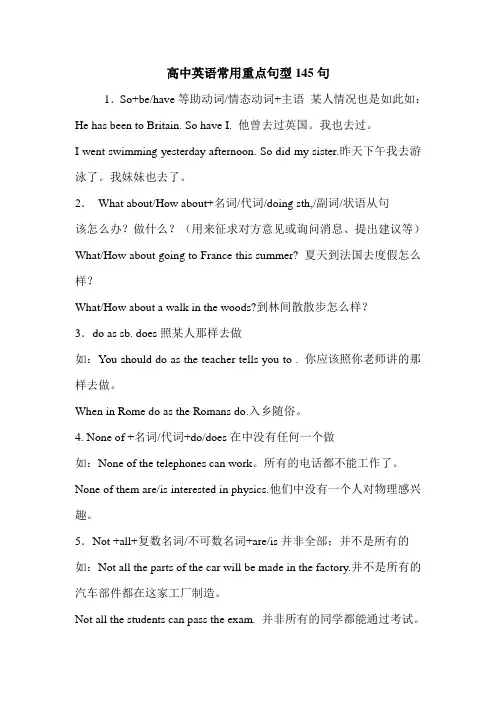
高中英语常用重点句型145句1.So+be/have等助动词/情态动词+主语某人情况也是如此如:He has been to Britain. So have I. 他曾去过英国。
我也去过。
I went swimming yesterday afternoon. So did my sister.昨天下午我去游泳了。
我妹妹也去了。
2.What about/How about+名词/代词/doing sth,/副词/状语从句该怎么办?做什么?(用来征求对方意见或询问消息、提出建议等)What/How about going to France this summer? 夏天到法国去度假怎么样?What/How about a walk in the woods?到林间散散步怎么样?3.do as sb. does照某人那样去做如:You should do as the teacher tells you to . 你应该照你老师讲的那样去做。
When in Rome do as the Romans do.入乡随俗。
4. None of +名词/代词+do/does在中没有任何一个做如:None of the telephones can work。
所有的电话都不能工作了。
None of them are/is interested in physics.他们中没有一个人对物理感兴趣。
5.Not +all+复数名词/不可数名词+are/is并非全部;并不是所有的如:Not all the parts of the car will be made in the factory.并不是所有的汽车部件都在这家工厂制造。
Not all the students can pass the exam. 并非所有的同学都能通过考试。
Not all factories here produce shirts. 这儿的工厂不都生产衬衣。
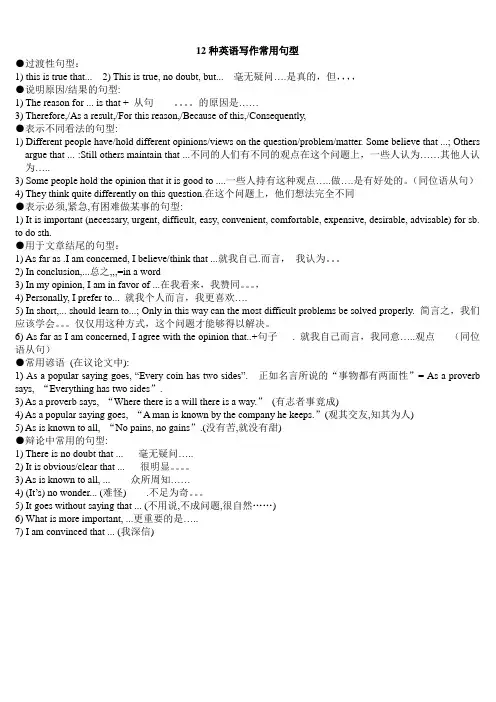
12种英语写作常用句型●过渡性句型:1) this is true that... 2) This is true, no doubt, but... 毫无疑问….是真的,但,,,,●说明原因/结果的句型:1) The reason for ... is that + 从句。
的原因是……3) Therefore,/As a result,/For this reason,/Because of this,/Consequently,●表示不同看法的句型:1) Different people have/hold different opinions/views on the question/problem/matter. Some believe that ...; Others argue that ... :Still others maintain that ...不同的人们有不同的观点在这个问题上,一些人认为……其他人认为…..3) Some people hold the opinion that it is good to ....一些人持有这种观点…..做….是有好处的。
(同位语从句)4) They think quite differently on this question.在这个问题上,他们想法完全不同●表示必须,紧急,有困难做某事的句型:1) It is important (necessary, urgent, difficult, easy, convenient, comfortable, expensive, desirable, advisable) for sb. to do sth.●用于文章结尾的句型:1) As far as .I am concerned, I believe/think that ...就我自己.而言,我认为。
2) In conclusion,...总之,,,=in a word3) In my opinion, I am in favor of ...在我看来,我赞同。
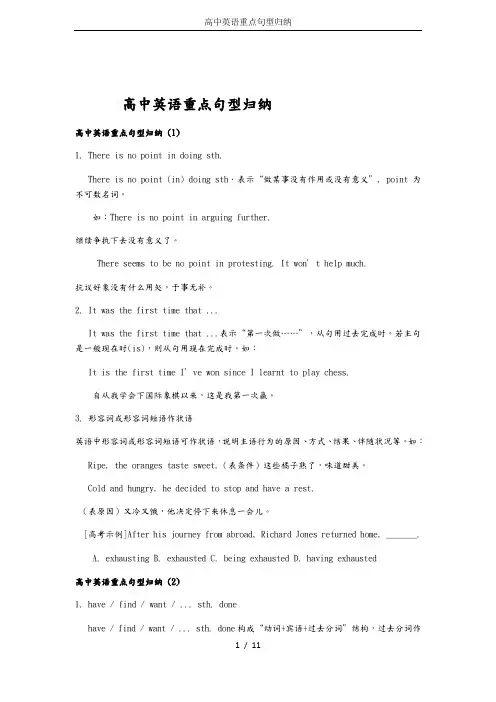
高中英语重点句型归纳高中英语重点句型归纳 (1)1. There is no point in doing sth.There is no point (in) doing sth.表示“做某事没有作用或没有意义”, point为不可数名词。
如:There is no point in arguing further.继续争执下去没有意义了。
There seems to be no point in protesting. It won’t help much.抗议好象没有什么用处,于事无补。
2. It was the first time that ...It was the first time that ...表示“第一次做……”,从句用过去完成时。
若主句是一般现在时(is),则从句用现在完成时。
如:It is the first time I’ve won since I learnt to play chess.自从我学会下国际象棋以来,这是我第一次赢。
3. 形容词或形容词短语作状语英语中形容词或形容词短语可作状语,说明主语行为的原因、方式、结果、伴随状况等。
如:Ripe, the oranges taste sweet.(表条件)这些橘子熟了,味道甜美。
Cold and hungry, he decided to stop and have a rest.(表原因)又冷又饿,他决定停下来休息一会儿。
[高考示例]After his journey from abroad, Richard Jones returned home, _______.A. exhaustingB. exhaustedC. being exhaustedD. having exhausted高中英语重点句型归纳 (2)1. have / find / want / ... sth. donehave / find / want / ... sth. done构成“动词+宾语+过去分词”结构,过去分词作宾语补足语表示与宾语之间是被动关系。
高中英语句式篇一:高中英语主要句型高中英语主要句型56一、以形式主语it引导的句型。
句型1.It (so) happened(chanced) that +clause. = sb. happened /chanced to do sth. =sb.did sth. by chance. 如:It happened that he was out when I got there. 当我到那儿时,碰巧他不在。
=He happened to be out when I got there.= It chanced that he was out when I got there= He was out by chance when I got there.句型2.It seems that sb. do/ be doing/ have done/ had done= Sb. seems to do/ be doing/ have done/to be done/to have been done(还有动词appear等可这样使用)如:It seemed that he had been to Beijing before.他好象以前去过北京。
=He seemed to have been to Beijing before.句型3.It is / was+被强调的部分+that(who)+剩余的部分.如:It wasn't until he came back that I went to bed.直到他回来我才睡觉。
(一定要注意被强调句型中的谓语动词否定的转移)。
It was because he was ill that he didn't e to school today.只因为他有病了今天没有来上学。
(只能用because而不能用for, as 或since)It is I who am a student. 我确实是个学生。
高中英语常用句型集锦1.be about to do 。
when2.It takes (sb sth(money/time to do sth 做某事花费某人...3.There seems to do/be 好像=it seems that/as if4.There is no doubt that5.It is no wonder that6.It is/has been 3 years since 从句用一般过去时态。
7.Before 过多久...才;不久就;还没等...就8.I didn't realize i made a mistake until he told me the truth.9.It was not until he told me truth that i realized that i made a mistake.10.not until he told me truth did i realize that i made a mistake11.it is(high/about time that sb did/should do sth/for sb to do sth.某人该做某事了It is the first/second/last time that sb have/has done sth was had done某人第几次做某事12.it is said/reported/thought/believed/known that 据说、据报道、认为、众所周知13.=sb/sth is said/reported/thought/believed/known to do(be/to be doing/to have done/to have been done14.It happened that 碰巧...15.There are chances that...= chances are that ... 可能...16.It occurs to sb that ...= it strikes sb that =Sth occurs to/strikes sb 某人突然想起...17.Sb find/think/ feel/consider it +形容词+ to do 某人发现、认为感觉做某事....18. Sth makes it +形容词+ to do ...使得做某事。
第一部分高中英语作文常用句子及翻译一、英语作文常用句子及翻译1.There is no doubt that our educational system leaves something to be desired. 毫无疑问的我们的教育制度令人不满意。
2.So precious is time that we can’t afford to waste it.时间是如此珍贵,它经不起我们浪费。
3.Rich as our country is, the qualities of our living are by no means satisfactory. 虽然我们的国家富有,我们的生活品质绝对令人不满意。
4.The more books we read, the more learned webecome.我们书读愈多,我们愈有学问。
5.There is no one but longs to go to college.没有人不渴望上大学。
6.It is conceivable that knowledge plays an important role in ourlife.可想而知,知识在我们的一生中扮演一个重要的角色。
7.The progress of thee society is based on harmony.社会的进步是以和谐为基础的。
8.We should spare no effort to beautify ourenvironment.我们应该不遗余力的美化我们的环境。
9.Thanks to his encouragement, I finally realized my dream.因为他的鼓励,我终于实现我的梦想。
二、英语作文常用句子及翻译1.Time flies.时光易逝。
2.Time is money.一寸光阴一寸金。
3.Time and tide wait for no man.岁月无情;岁月易逝;岁月不待人。
英语作文十大万能句型高中在高中英语写作中,使用一些万能句型可以帮助我们更好地组织思路,提升作文表达的连贯性和逻辑性。
下面介绍十个常用的英语作文万能句型,希望对同学们的写作有所帮助。
1.表示观点:–I believe that…–From my perspective…–It is widely believed that…2.引出原因:–One of the main reasons is…–Another contributing factor is…–This can be attributed to the fact that…3.表示利弊:–On the one hand…–On the other hand…–Despite the advantages, there are also some disadvantages.4.提出建议:–It is high time we did…–One possible solution is…–We should take effective measures to…5.进行比较:–Similarly…–Likewise…–In contrast to…6.表示结果:–As a result…–Consequently…–This leads to the conclusion that…7.表达目的:–In order to…–With the aim of…–For the purpose of…8.列举理由:–Firstly…–Secondly…–Finally…9.进行强调:–It should be emphasized that…–It is worth noting that…–Of particular importance is…10.总结观点:–In conclusion…–To sum up…–All in all…这些句型并非刻板,可以根据具体情况做适当调整和组合,使得作文表达更加丰富和精彩。
高中英语写作中八大类常用句型有一句话说得好:熟能生巧,平时多积累闪光的单词、短语和句型,学会在写作中自己套用,用多了自然也就熟悉了,下面,小编在这给大家带来高中英语写作中八大类常用句型,欢迎大家借鉴参考!高中英语写作中八大类常用句型1一、开头句型1.As far as ...is concerned就……而言2.It goes without saying that...不言而喻,...3.It can be said with certainty that...可以肯定地说......4.As the proverb says,正如谚语所说的,5.It has to be noticed that...它必须注意到,...6.It s generally recognized that...它普遍认为...7.It s likely that ...这可能是因为...8.It s hardly that...这是很难的......9.It s hardly too much to say that...它几乎没有太多的说…10.What calls for special attention is that...需要特别注意的是11.There s no denying the fact that...毫无疑问,无可否认12.Nothing is more important than the fact that...没有什么比这更重要的是…13.what s far more important is that...更重要的是…高中英语写作中八大类常用句型2二、衔接句型1.A case in point is ...一个典型的例子是...2.As is often the case...由于通常情况下...3.As stated in the previous paragraph如前段所述4.But the problem is not so simple. Therefore 然而问题并非如此简单,所以……5.But it s a pity that...但遗憾的是…6.For all that...对于这一切......7.In spite of the fact that...尽管事实......8.Further, we hold opinion that...此外,我们坚持认为,...9.However , the difficulty lies in...然而,困难在于…10.Similarly, we should pay attention to...同样,我们要注意...11.not(that)...but(that)...不是,而是12.In view of the present station.鉴于目前形势13.As has been mentioned above...正如上面所提到的…14.In this respect, we may as well (say)从这个角度上我们可以说15.However, we have to look at the other side of the coin, that is...然而我们还得看到事物的另一方面,即…高中英语写作中八大类常用句型3三、结尾句型1.I will conclude by saying...最后我要说…2.Therefore, we have the reason to believe that...因此,我们有理由相信…3.All things considered,总而言之4.It may be safely said that...它可以有把握地说......5.Therefore, in my opinion, it s more advisable...因此,在我看来,更可取的是…6.From what has been discussed above, we may safely draw the conclusion that….通过以上讨论,我们可以得出结论…7.The data/statistics/figures lead us to the conclusion that….通过数据我们得到的结论是,....8.It can be concluded from the discussion that...从中我们可以得出这样的结论9.From my point of view, it would be better if...在我看来……也许更好高中英语写作中八大类常用句型4四、举例句型1.Let s take...to illustrate this.2.let s take the above chart as an example to illustrate this.3. Here is one more example.4.Take … for example.5.The same is true of….6.This offers a typical instance of….7.We may quote a common example of….8.Just think of….高中英语写作中八大类常用句型5五、常用于引言段的句型1. Some people think that ….有些人认为…2.To be frank, I can not agree with their opinion for the reasons below.坦率地说,我不能同意他们的意见,理由如下。
高中英语32个常用句型以下是高中英语常见的句型及其用法:1、Simple Sentence(简单句)简单句是由一个主语和一个谓语构成的句子,句子结构简单明了,表达直接。
例如:She sings well.(她唱得很好。
)2、Compound Sentence(并列句)并列句由两个或多个并列关系的主句组成,中间用逗号、分号或连词连接。
例如:Mary went to the store, and John went to the library.(玛丽去商店,约翰去图书馆。
)3、Complex Sentence(复合句)复合句由一个主句和一个或多个从句组成,从句是一个完整的句子结构,需要一个主句来完善意义。
例如:Although he was tired, he continued to work.(虽然他很累,但他继续工作。
)4、Compound-Complex Sentence(复合并列句)复合并列句由两个或多个主句和一个或多个从句组成,其中至少一个主句包含有两个或以上的并列句。
例如:I was walking in the park, and I saw a bird fly by, but when I looked closer, it was actually a butterfly.(我在公园里走路,看到一只鸟飞过,但当我仔细看时,它实际上是一只蝴蝶。
)5、Interrogative Sentence(疑问句)疑问句是用来提出问题的句子,通常以一个疑问词开头(如what、when、where、why、who等)或以动词的助动词(如do/does/did、is/am/are、can/could、will/would等)开头。
例如:Why did you not come to the party last night?(为什么你昨晚没来参加聚会?)6、Imperative Sentence(祈使句)祈使句是用来表达命令、请求、建议或劝告的句子,通常省略了主语,以动词开头,表示强调语气。
1 高中英语常用句型归纳总结 1. be doing/ be about to do/ had done…, when…(when:这时, 强调一个动作的突然发生) 1). I was walking along the river, when I heard a drowning boy cry for help. 2). I was about to leave when it began to rain. 3). I had just finished my test paper when the bell rang, announcing the exam was over. 2. It was (not ) + 时间段+before +一般过去时 过了一段时间就…….. It will (not )be+ 时间段+before +一般现在时 要过一段时间才会… It is/ has been +时间段+ since….. It was +点时间+ when….. It was +时间状语+ that …..(强调句) 1). It was not long before he sensed the danger of the position.不久他就意识到他处境危险 2). It will be half a year before you graduate from the school. 还有半年你才从这个学校毕业 3). It is 3 years since he worked here.=he left here.(since从句中的谓语动词若是延续性动词,要从这个动作结束的时候算起) 4). It was 3 o‟clock when they received the telephone. 5) It was at 3 o‟clock that they received the telephone. 3. once…..一旦….., 表示时间和条件 1)Once you understand what the teacher explained, you will have no difficulty doing the work. 2). Once you have decided to do something, you should finish it and do it well. 4. The +比较级…….,the +比较级……..越……, 越…… 1) The more books you read, the more knowledge you will get. 2)The busier he is, the happier he feels. 5. as if/ as though…..(表示与事实相反,用虚拟;若表示即将成为事实或有可能成为事实,则用陈述语气) 1). He was in great trouble, but he acted as if nothing had happened. 2). Although they just met for the first time, they talked as if they had been friends for many years 3). The clouds are gathering. It looks as if it is going to rain. 6. n. /adj. / adv. / v. + as / though +主语+谓语, 尽管……,…….引导让步状语从句 1).Child as he is, I already know what career I want to follow. 2). Try as he might, he couldn‟t solve the problem. 3). Much as I respect him, I can‟t agree with his idea. 7. whether….or…. 无论是….还是…. 1). Whether the weather is good or bad, they will set off as they planned. 2). Any person, whether young or old, has his own worth. 8. 疑问词+ever = no matter +疑问词, 引导让步状语从句或名词性从句 1). Whichever(=No matter which) you like, you can take it away .( 让步状语从句) You can take away whichever(=any one that) you like ( 名词性从句) 2). Whenever you comes, you will be welcome. ( 让步状语从句) 3). Whatever happens, I will support you. ( 让步状语从句) 4). Whoever breaks the law, he will certainly be punished. ( 让步状语从句) Whoever breaks the law will certainly be punished. ( 名词性从句) 5). However great the difficulty is, we can overcome it. ( 让步状语从句) 9. as long as/so long as/ providing that/ provided that/ supposing that/ on condition that 假如….. 1). I will lend you money on condition that you can return it within 3 months. 2
10. in case that/ in case of….. 万一….., 以防….. 1). In case of fire, please dial 119 at once. 2). In case that John comes/ John should come, tell him to wait. 11. 祈使句+ or/otherwise +结果句 或 祈使句+ and +结果句 1). Stop doing such foolish thing, or you will be punished in time. 2). More effort, and the problem would have been settled. 3). Think it over, and you will find the answer. 12. so/ such……..that…….引导结果状语从句时须注意
当名词前many, much, little, few有修饰时, 用so不用such因为此时的中心词不再 是名词,而是many, much, little, few这些表示数量的词。 1). The westerners eat so much fat and sugar that they put on weight easily. 2). There are so few fish in the lake that we couldn‟t fish them easily.
当名词是单数可数名词,前面又由adj.修饰时,注意冠词的位置,即so+ adj +a(n)+n 或such+ a(n) + adj.+ n 1). He is such an honest person/ so honest a person that you can depend on him when you are in trouble. 当so/such引导的部分位于句首时,主句要用部分倒装结构 1). Such great progress has he made in his studies that we all admire him.
当主从句主语一致时可与动词不定式相互转换,即变成so/such…….as to do结构。 1).The westerners eat so much fat and sugar as to put on weight easily. 13. so that 引导目的状语从句与结果状语从句
so that引导目的状语从句时常与情态动词连用(= in order that),当主从句主语一致时可转换为so as to do/ in order to do. 1). He turned up the radio a little so that he could hear the news clearly. He turned up the radio a little so as to hear the news clearly. 2). He closed all the windows while driving so that he shouldn‟t catch cold.(否定句中情态动词用shouldn‟t)
so that 引导结果状语从句一般不与情态动词连用 1). He turned up the radio a little so that he heard the news clearly. 14.can never/ can’t 与too, too much, enough, over- 搭配表示“无论怎样….都不过分” 1). While you are doing your homework, you can’t be careful enough. 2). He is such a great man that we can’t praise him too much. 3). William Hartley was handsome, determined and hardworking, in a word, I couldn’t speak too highly of him. 4). The development of society has made it necessary for us to have a good knowledge of English, so we can‟t overemphasize the importance of learning English. 5). Since it is a good thing, we can‟t do it too soon. 15. 不定式作主语,it作形势主语: It +系动词+adj./ n..+ for sb. to do It +系动词+adj.+ of sb. to do 1). It‟s important for us to have a good knowledge of English. 2). How rude of him to treat a child like that! 3). It‟s thoughtful of him to fix us up for the night. 16. 不定式作宾语,it作形势宾语: 主语+think/ consider/believe/ make/ feel+ it +adj./n. +for sb./ of sb. +to do 1). I feel it foolish of him to believe such a man.